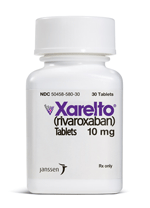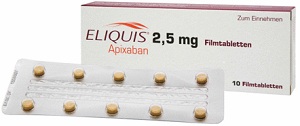 New oral anticoagulants (NOACs)--such as Johnson & Johnson's ($JNJ) Xarelto and Boehringer Ingelheim's Pradaxa--have been in fierce competition with one another for awhile now. But they still have a ways to go to displace the old-guard therapy warfarin--and one GlobalData analyst thinks she knows why.
New oral anticoagulants (NOACs)--such as Johnson & Johnson's ($JNJ) Xarelto and Boehringer Ingelheim's Pradaxa--have been in fierce competition with one another for awhile now. But they still have a ways to go to displace the old-guard therapy warfarin--and one GlobalData analyst thinks she knows why.
Doctors need more real-world safety data--especially in patients with a high risk of cardiovascular disease--before they toss warfarin aside, according to the research and consulting firm's Lakshmi Dharmarajan.
With all members of the class currently lacking approved reversal agents, "most physicians are reluctant to take responsibility for possible complications, such as gastrointestinal bleeding, that may arise from using higher doses" of the new-age treatments, she said in a statement. And "as a result, there is a tendency among healthcare providers to resort to using warfarin for high-risk patients, even though it does not perform very well in these cases."
So what can makers of the next-gen blood thinners do to turn things around? For starters, they can get their antidotes to market ASAP. On that front, Boehringer recently took a step forward, winning an European recommendation for its candidate, Praxbind, late last week. Portola Pharmaceutical is also working on a prospect of its own, andexanet alfa, that it hopes will win approval to undo the effects of Pradaxa's rivals, J&J's Xarelto and Bristol-Myers ($BMY) and Pfizer's ($PFE) Eliquis.
 But the drugmakers can also mine smaller observational studies and registry data to turn up evidence that using lower doses of the warfarin replacement therapies--which has been recommended for some patients--can produce detrimental effects, she pointed out. The way she sees it, companies could use those kind of data to convince the FDA "to re-think its stance on the currently approved doses."
But the drugmakers can also mine smaller observational studies and registry data to turn up evidence that using lower doses of the warfarin replacement therapies--which has been recommended for some patients--can produce detrimental effects, she pointed out. The way she sees it, companies could use those kind of data to convince the FDA "to re-think its stance on the currently approved doses."
The warfarin rivals have already turned to real-world data to help cement their products' safety profiles--and to try to get a leg up on one another. At this month's European Society of Cardiology Congress in London, J&J and partner Bayer touted positive real-world results for Xarelto, while nemeses Pfizer and Bristol-Myers Squibb--which work together on third-to-market Eliquis--trumpeted "significant reductions in major bleeding" when compared with Xarelto and warfarin, Pfizer senior medical director Sonal Bhatia told FiercePharma.
Still, though, there's "still quite a ways to go" when it comes to unseating warfarin, Jörg Kreuzer, Boehringer's cardiovascular medicine head, told FiercePharma in an interview. "More and more people are being initiated on NOACs for stroke prevention, but still more than half of the patients are on warfarin," he said.
- read the GlobalData release
Special Reports: Top 10 drug brands by payments to doctors - Xarelto - Eliquis | Top 15 drug launch superstars - Xarelto | Top 15 pharma companies by 2014 revenue - J&J - Bayer - Pfizer - Bristol-Myers Squibb